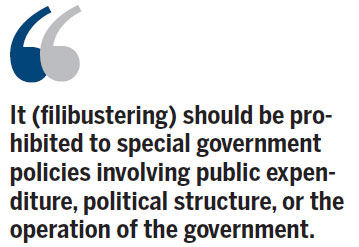Why filibustering tactics breach the Basic Law
Updated: 2014-05-19 07:40
By Song Sio-Chong(HK Edition)
|
|||||||||
It has been reported that the Hong Kong Appropriation Bill had been subjected to a filibuster holding up voting on 1,192 amendments to the budget. Acting Chief Executive Carrie Lam warned that HK$78 billion in interim budget funding will be used up by the end of the month. But lawmakers responsible for filibustering tactics, from People Power and League of Social Democrats, plan to continue filibustering until May 31. Legislative Council (LegCo) President Jasper Tsang has said filibusters must be handled under proper rules of procedures. But there are differences between the opposition and the pro-establishment camp on how filibustering should be dealt with.
It appears that no one in LegCo will do anything to discourage filibustering. The budget and also Hong Kong's future are in the hands of a few fanatics. These troublemakers are tolerated by a LegCo president, reluctant to exercise his powers to stop filibustering.
But this not only concerns the LegCo president's ability to stop filibustering. It also raises questions about whether the rules of procedure for filibustering do, in fact, contravene the Basic Law. It also concerns the issue of whether all LegCo members, including the president, are upholding the Basic Law - or upholding rules of procedure which actually contravene the Basic Law.

Article 75(2) of the Basic Law states that "the rules of procedure of the LegCo shall be made by the council on its own, provided that they do not contravene this law." This means that if rules which allow filibustering contravene the Basic Law, they should be regarded as unconstitutional and declared void. Under this law, certain filibustering tactics can be banned - perhaps once and for all.
In my opinion, filibustering should be limited to private bills and public bills relating to ordinary government policies. But it should be prohibited to special government policies involving public expenditure, political structure, or the operation of the government.
I would like to cite Article 74 of the Basic law as part of this discussion. It states clearly that a "member of the LegCo of the HKSAR may introduce bills in accordance with the provisions of this law and legal procedures. Bills which do not relate to public expenditure or political structure or the operation of the government may be introduced individually or jointly by members of the council. The written consent of the Chief Executive shall be required before bills relating to government policies are introduced."

If I have interpreted this correctly, bills relating to government policy are classified into two categories. One concerns special government policies - like public expenditure, political structure or the operation of the government; and another, general government policy. The former policies are exclusively reserved for the government. They are beyond the scope of council members to introduce. The latter may be introduced by council members, but they must be subject to the written consent of the Chief Executive.
The key spirit of the Basic Law is "executive-led" - as repeatedly stressed by drafters of the law and the central government. I believe one characteristic of executive-led government is to limit, restrict, and prohibit introduction of various bills by council members. Most bills should be introduced by the government alone. A key issue is whether amendments to bills should be covered by the same principle. Two Latin maxims are useful to our discussion in resolving this problem. One is accessio cedit principali - "An addition to the principle thing becomes part of it."; and accessorium non ducit sed sequitur suum principale - "The accessory does not lead, but follow its principal."
If we follow the logic of these sayings, the original bill can be regarded as the principal, and any amendments to the original bill can be treated as an accessory. If council members are prohibited from introducing an original bill regarding public expenditure, then naturally 1,192 amendments to that bill should also prohibited.
The 1,192 amendments to the original bill can be classified in the latter category and, therefore, subject to written consent from the Chief Executive. Without this, these amendments cannot be introduced and should be considered invalid.
According to Article 73(1) of the Basic Law, LegCo is entitled to examine and approve budgets introduced by the government - without mentioning any amendments. But either way, the introduction of 1,192 amendments to the budget, irrespective of their classification, are not in accordance with the Basic Law. Even if these amendments conform to the rules of procedure; they are still not valid. They violate the Basic Law.
The author is a HK veteran commentator and professor at the Research Center of Hong Kong and Macao Basic Law, Shenzhen University.
(HK Edition 05/19/2014 page9)